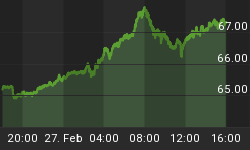While less known than the China's Middle Kingdom, its middle finger might have more immediate financial consequences.
How do you upset China?
- You start buying fewer Chinese products (as a result of a recession)
- You start devaluing the $1 trillion in credit they have lent you for earlier purchases (as a result of massive interest rate cuts)
According to a recent Fortune article, the legendary investor Julian Robertson "believes that the Federal Reserve will continue to flood the economy with money, weakening the currency and ultimately causing the Japanese and Chinese central banks to stop purchasing Treasuries, which will drive the price of 10-year bonds down [and the yield up]."
If the Chinese do become frustrated with the U.S. and stop purchasing our Treasuries, the consequences could be dramatic. In essence, the Fed would no longer be able to flood the market with liquidity without serious consequences, such as inflation and higher long-term interest rates. Imagine a shopper without a real job who depends on his credit card for cash flow. Now imagine this shopper just received word from his credit card company that he's reached his credit limit. The result: less shopping and higher interest payments.
As many of my readers know, I have been a long-term bull on commodities. I was invested in oil several years back and gold more recently. I sold most of my oil positions when oil set up a double top at $100. This week, I sold most of my gold positions between $910 and $930. Heresy, cry the goldbugs! I'm still bullish long term on both oil and gold, but I'm turning bearish short term.
In the short term, the problem is that gold faces some serious headwinds if long-term interest rates are going up. The most significant headwind would be a rallying dollar. In addition, oil, which correlates heavily with gold, seems to be breaking down.
My current view is that the problem with oil isn't oil itself, but rather refining capacity. Oil production has increased but refining capacity is limited. In addition, gasoline prices are set to go up SHARPLY over the next couple of months because of additive costs (the move from MTBE is proving costly: http://www.chron.com/disp/story.mpl/front/5499656.html). The triple threat of higher gasoline prices, a recession, and the rollover into the shoulder season could greatly reduce the demand for oil. For the last several years, oil producers have been gung ho in increasing production. And lately oil prices have run up dramatically. The trade is crowded with speculators, and prices could fall off quickly.
If the dollar is putting in a double bottom and oil is falling apart, gold could take a breather. I've made a lot of money on gold. I'm happy with that. I'll get back in when things look to be more obviously in my favor.
So could it be that the best new bet is shorting long bonds, going long the dollar, and being negative on commodities? After so many years of dollar declines and commodity increases, it's hard to believe, but the graphs do lend support to this theory. The dollar seems to have put in a strong floor at 1.49 to the Euro, several commodity futures curves have inverted, and the trendy new trade among hedge funds is to play the "steepening" of interest rates. If the dollar can hold for the next couple weeks above 1.49, I think the Fed might finally have to grow up, and I think investors will have to rethink the ideas that have worked so well for the last several years.
Exhibit 1: Several months of resistance at 1.49
Exhibit 2: Futures curve of Wheat is inverted
Exhibit 3: Futures curve of Copper is inverted
Exhibit 4: Future delivery of Long Bonds suggests higher interest rates ahead
Exhibit 5: A stronger dollar would support bearish equity indicators, such as the Dow forming a classic head-and-shoulders pattern















